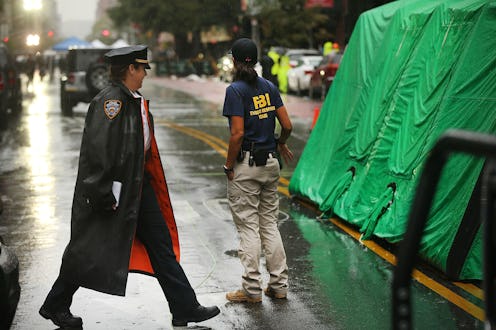News
How To Prepare For Hurricane Matthew
As the raging Category 4 tropical storm Hurricane Matthew has been heading toward Florida and is predicted to make its way up the East Coast this weekend, it's only responsible to figure out ways to prepare for Hurricane Matthew. Because if you do, the worst-case scenario is that you're stocked with useful supplies and a newfound sense of rugged survivalism.
While hurricane preparation often focuses on surviving the storm itself, which is obviously the top priority, the aftereffects of a hurricane often demand the most preparation. Often, once a storm has passed through, there are sustained power outages, damages to infrastructure, and massive flooding, which prevent necessary activities, such as grocery shopping or showering.
While the southeastern portion of Florida is already preparing for Hurricane Matthew and its terrifying 145 mph winds, it seems only reasonable for those living up the East Coast to freshen up on the basics of hurricane survival. After all, the hurricane could swoop near the border of North Carolina and South Carolina, which makes it all the more important to stock up on the goods. This leaves us with the obvious question at hand, which is: What supplies do you need to survive a hurricane, and how much should you buy to be safe?
There is no one-size-fits-all emergency list, but these are a few surefire basics you'll need to prepare for Hurricane Matthew.
Food
This may seem like a given, but it's all too easy to forget how many staple foods quickly go rotten without a working fridge, so you have to be strategic with your choices. Smart, easy, and lasting foods to stock up on in the event of a hurricane include peanut butter, bread (it goes bad, but you'll eat it), raw fruit, and crackers. Also, canned foods are your savior in the event of a hurricane, so you should stock up on tuna, canned chicken, beans, green beans, canned milk, and juice. And, of course, ready-to-eat granola bars and meal bars, as well as cereals.
Water
Again, this may seem obvious, but one of the most common mistakes made when preparing for a hurricane is not buying enough water. Depending on how many people there are in your household, you'll want to estimate two gallons of water per person, per day. One gallon a day is for drinking, another gallon a day is for bathing or hygiene purposes in the event that your water breaks.
Medical Supplies
Whether you're already stocked with a full cabinet of medical tools, or you have a dusty old First Aid Kit, you'll want to double-check your medical supplies. Make sure you're stocked with Band-Aids, antibacterial hand soap (you'll particularly need this if your water goes out), over-the-counter painkillers, back-ups of any personal prescriptions, gauze and duct tape in the event of injury, and hydrogen peroxide for cleaning wounds. If your household includes infants, make sure to stock up on diapers and infant hygiene products as well.
Light And Warmth
In the case of an extended power outage, you'll be responsible for keeping your household both (relatively) warm and lit. In order to do this, you'll need to stock up on batteries, flashlights, matches, candles, a fire extinguisher, a battery-powered NOAA Weather Radio (if possible), sleeping bags, pillows, waterproof tarps and rope (for possible leaks), waterproof containers for personal legal documents, and even sunscreen.
Cleaning And Pet Supplies
For households with pets, it'll be essential to stock up on pet supplies, which include roughly a gallon of water a day for the pet (this can be split between showering and drinking purposes), dry food, any pet medications, litter, doggy bags, and owner documentation. For cleaning supplies, it's crucial to be overstocked with garbage bags, gloves, cleaning sprays, a sturdy broom and dustpan, and possibly a battery-powered mini vacuum.
For other hurricane survival tips, be sure to check out the National Hurricane Center website, where there are even more resources.
